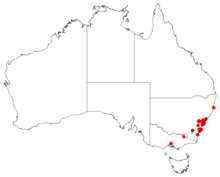Bossiaea scolopendria, commonly known as plank plant,[2] is a species of flowering plant in the family Fabaceae and is endemic to New South Wales. It is an erect, sparsely-branched shrub with flattened branches, ending in winged cladodes, the leaves mostly reduced to small scales except on the youngest branches, and yellow and red flowers.
| Plank plant | |
|---|---|

| |
| In Ku-ring-gai Chase National Park | |
| Scientific classification | |
| Kingdom: | Plantae |
| Clade: | Tracheophytes |
| Clade: | Angiosperms |
| Clade: | Eudicots |
| Clade: | Rosids |
| Order: | Fabales |
| Family: | Fabaceae |
| Subfamily: | Faboideae |
| Genus: | Bossiaea |
| Species: | B. scolopendria
|
| Binomial name | |
| Bossiaea scolopendria | |

| |
| Occurrence data from AVH | |
Description
editBossiaea scolopendria is an erect, sparsely-branched shrub that typically grows to a height of up to 1.5 m (4 ft 11 in) or more. The branches are flattened and end in winged cladodes 6–15 mm (0.24–0.59 in) wide. Leaves are only present on young growth and are soon replaced by scales 1–2 mm (0.039–0.079 in) long and 0.4–0.6 mm (0.016–0.024 in) wide. The flowers are borne in up to thirty nodes on the sides of cladodes, each flower 10–14 mm (0.39–0.55 in) long on a pedicel 1–3 mm (0.039–0.118 in) long. There are two scales and one or a few bracts 1.5–2.5 mm (0.059–0.098 in) long at the base and bracteoles about 1.5–2.5 mm (0.059–0.098 in) long near the middle of the pedicel. The five sepals are 4–6 mm (0.16–0.24 in) long and joined at the base forming a tube, the upper lobes 2–3 mm (0.079–0.118 in) long and 1.0–1.5 mm (0.039–0.059 in) wide, the lower lobes 1.5–2.5 mm (0.059–0.098 in) long. The standard petal is yellow with a red base and up to about 15 mm (0.59 in) long, the wings are purplish brown and 3–4 mm (0.12–0.16 in) wide, and the keel is pale greenish yellow and 3–4 mm (0.12–0.16 in) wide. Flowering mainly occurs from August to September and the fruit is an oblong pod 30–45 mm (1.2–1.8 in) long.[3][4][5][6]
Taxonomy
editPlank plant was first formally described in 1801 by Henry Cranke Andrews who gave it the name Platylobium scolopendrium in his book, The Botanist's Repository for New, and Rare Plants.[7][8] In 1808, James Edward Smith changed the name to Bossiaea scolopendria in Transactions of the Linnean Society of London.[9][10]
Distribution and habitat
editBossiaea scolopendria grows in heathland and forest on sandstone in near-coastal areas of central and southern New South Wales.[4][5]
References
edit- ^ "Bossiaea scolopendria". Australian Plant Census. Retrieved 1 September 2021.
- ^ Alan Fairley – Wildflowers of Sydney and adjoining areas ISBN 1-876473-38-X page 59
- ^ Wood, Betty. "Bossiaea scolopendria". Lucid Keys. Retrieved 1 September 2021.
- ^ a b "Bossiaea scolopendria". Royal Botanic Garden Sydney. Retrieved 1 September 2021.
- ^ a b Thompson, Ian R. (2012). "A revision of eastern Australian Bossiaea (Fabaceae: Bossiaeae)". Muelleria. 30 (2): 164–165. Retrieved 26 August 2021.
- ^ Bentham, George; von Mueller, Ferdinand (1864). Flora Australiensis. London: Lovell Reeve & Co. pp. 161–162. Retrieved 1 September 2021.
- ^ "Platylobium scolopendrium". APNI. Retrieved 1 September 2021.
- ^ Andrews, Henry Cranke (1801). The Botanist's Repository for New, and Rare Plants. p. 191. Retrieved 1 September 2021.
- ^ "Bossiaea scolopendria". APNI. Retrieved 1 September 2021.
- ^ Smith, James Edward (1808). "Characters of Platylobium, Bossiaea and of a new Genus named Poiretia". Transactions of the Linnean Society of London. 9: 303. Retrieved 1 September 2021.